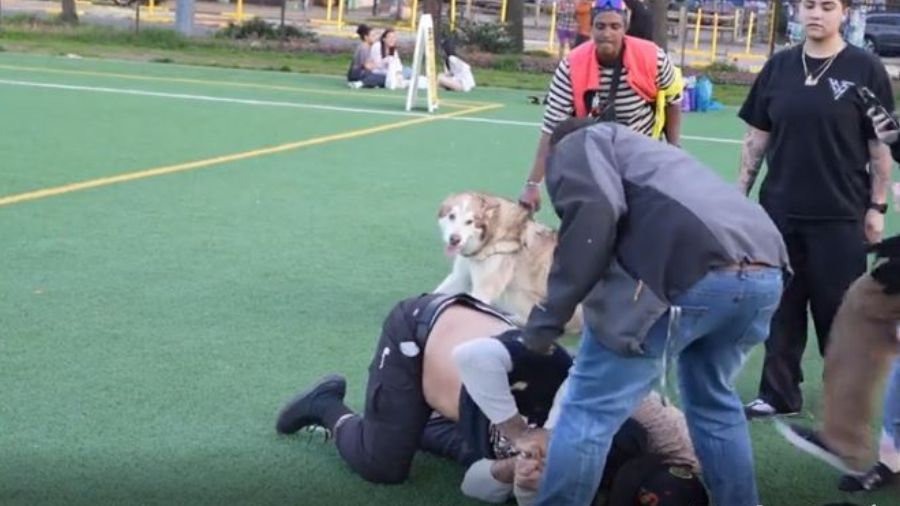Seattle, King County leaders pitch plan to address prolific offenders
Sep 13, 2019, 4:28 PM | Updated: Sep 14, 2019, 7:20 am

Mayor Jenny Durkan discusses four proposals for addressing prolific offenders. Also picturd are King County Executive Dow Constantine and King County Prosecutor Dan Satterberg. (KIRO Radio, Hanna Scott)
(KIRO Radio, Hanna Scott)
There’s been a major push for Seattle and King County leaders to do something about the issue of repeat offenders.
The issue was highlighted in February’s System Failure report, which detailed the small group of offenders cycling in and out of jail for repeated lower-level crimes like theft. These are offenders who are nearly all homeless, on drugs dealing with mental health issues, or all of the above.
The report prompted Seattle Mayor Jenny Durkan to create a work group with police, judges, prosecutors, public health, and other city and county leaders to figure out what could be done at the local level.
“That group has developed four new pilot programs to address the challenge of repeat offenders in our region and provide both accountability and support to the individuals to disrupt this cycle,” said Seattle Mayor Jenny Durkan at a Thursday’s press conference.
The proposals are focused on trying to close gaps in the system that prevent these offenders from getting treatment and services, and not merely locking them up, as some have called for.
“Simply going with an incarceration model is not going to cure the high rates that we’re seeing,” said City Attorney Pete Holmes. “That is appropriate for certain populations but it’s not going to solve the problems that we see on a larger scale on our streets.”
“Instead, we’re going to apply data-driven strategies and try to deal with these problems together,” Holmes added, stressing the point that this is an issue every city in the country is struggling with, not just Seattle.
Four proposals
The four proposals include enhanced probation that could involve probation counselors offering less jail time if the offender will go to treatment.
Another pilot program would create a position for a dedicated re-entry planner at the jail to help these offenders connect with services and get into shelter when they’re released so they aren’t just sent back to the streets without getting any help.
There would also be a new assistant city attorney position to oversee the pilots and existing programs such as diversion and determine if they’re working.
The final pilot program will be the 60-bed, 24/7 enhanced shelter on the second floor of the west wing of the jail, where people can get behavioral health treatment, case management, and more.
While those beds will be at the jail, staying in them would be voluntary.
“Let me be clear, this is not creating some kind of minimum security detention facility,” stressed King County Executive Dow Constantine. “This is an enhanced shelter with 24-hour services. No one is going to compelled or forced to reside there.”
King County Prosecutor Dan Satterberg says he can see the change on our streets, and he understands the frustration.
“The frustration that we feel has to come with a cost and the cost has to be to invest in the things that we know can continue to provide stabilizing services to people who need it,” Satterberg said.
Satterberg says programs like Law Enforcement Assisted Diversion – or LEAD – and the county’s VITAL program help with stabilization but are both full, as is the involuntary treatment court.
Satterberg says the key to all of these pilot programs is that they help get these repeat offenders connected to stabilization services, which is not happening now.
“There is no simple, singular policy that will meet the needs of this population and keep our community safe, “said Constantine.
“Instead we must build on our successes and our innovations,” Constantine added. “We must take risks and we must try new things because conventional thinking and conventional approaches are not going win this fight.”
They all stressed that there is only so much cities and counties can do on their own, and that there are also limits to what judges and the overall criminal justice system can do when it comes to these type of offenders.
Durkan also stressed the need for much more help from both the federal government and the state on behavioral health to truly solve this issue. But she says these four pilot programs are something can do right now here at the local level.
“To be clear, no one is saying that any of these pilots standing alone will solve the problem, but each represents a potential new tool,” Durkan said. “And if we see that tool works, we will be able to expand it more.”
Downtown Seattle Association President Jon Scholes was at the event where the pilot programs were announced. He says business owners and people who live or work in the city are dealing with assaults, threats and other violence and need solutions.
Scholes says they’re glad to see some new approaches on the table.
“The investment in the west wing of the jail to create a new facility with services embedded is an important one, we’ve got to make sure that people who need them, though, are the ones in that facility,” Scholes said.
Scholes says the important thing will be to evaluate this down the line in several months to see if it is having any impact on crime.
Both the city and county councils still have to approve the proposals in the upcoming budget process. The proposals are expected to cost the city about $3 million, while the county would kick in about $2.5 million.
From Thursday’s news release:
Pilot Program 1: Enhanced Shelter with On Demand Behavioral Health Services
Under this pilot program jointly funded by the City and King County, the County will create a 60 bed, 24/7 enhanced shelter that will provide on demand behavioral health, supportive housing, and case management services on the second floor of the King County Correctional Facility west wing. Services will be focused on individuals whose combination of long-term homelessness, unmet behavioral health needs, and lack of consistent connection to services and community brings them into frequent, expensive, and unsuccessful contact with the criminal legal and emergency medical systems.
A total of $4 million will be allocated for capital and additional $800,000 for program operations. The City and County will share these costs evenly, and accordingly Mayor Durkan’s proposed budget for 2020 includes $2.0 million for capital and $400,000 for operating costs.
Following investments in the facility, services are expected to begin by mid-2020.
Pilot Program 2: Rapid Re-Entry Connector
Currently, King County Jail Health Services provides limited reentry/release planning services to certain individuals who are in the King County Correctional facility for more than 72 hours. Release Planning staff assess behavioral health, physical health, housing, and other supportive service needs and connect individuals to appropriate services in the community upon release from custody. Yet most individuals booked into jail are released within 12-48 hours and cannot benefit from release planning. This pilot would begin to address the lack of release planning services available for those who rapidly exit the facility. The program would embed a reentry planner position within Jail Health Services who would triage individuals for services from an array of relevant programs such as LEAD, West Wing Enhanced Shelter, as well as community-based treatment, services, and housing.
The city is also providing additional funding to increase capacity for in-jail substance use disorder assessments. The assessments help determine appropriate level of care and treatment referrals.
Mayor Durkan’s proposed 2020 budget adds $212,500 for the pilot program. The program is expected to begin in early 2020.
Pilot Program 3: HB Probation
The HB probation pilot program would feature a smaller, specialized caseload for Seattle Municipal Court probation counselors who have training in harm-reduction and trauma-informed care strategies for a group of high barrier clients.
The counselor will be able to introduce graduated sanctions, offer small incentives for positive behavior, meet with individuals off-site (away from the courthouse) and schedule more frequent review hearings with judges. Balance suspended jail sentences may be offered to provide individuals the opportunity to have their jail sentence shortened if the client is willing to engage in chemical dependency treatment. The probation counselor’s expertise in working with high-needs clients will involve case coordination with other service providers including treatment providers, diversion personnel, Veteran’s Affairs, and others.
Mayor Durkan’s 2020 proposed budget adds $170,000 for this pilot program. This new funding would be paired with up to $120,000 of additional Municipal Court resources. If approved by City Council, the program could begin as soon as late 2019.
Pilot Program 4:
Case Conferencing & Support by Seattle’s City Attorney’s Office
A case conferencing approach with support by the Seattle City Attorney’s Office will be responsible for coordination across systems and programs, addressing those high barrier individuals involved in diversion programs, court programs or post-sentencing probation, and working both at a macro level to assess whether existing and proposed pilot programs are working and on individual cases – working to make a meaningful, holistic positive changes in the lives of the individuals who populate the list and the communities impacted by their behaviors.
Mayor Durkan’s 2020 budget adds $150,000 for an additional Assistant City Attorney position in the Criminal Division to ensure the ability to provide better outcomes and efficient case management.













